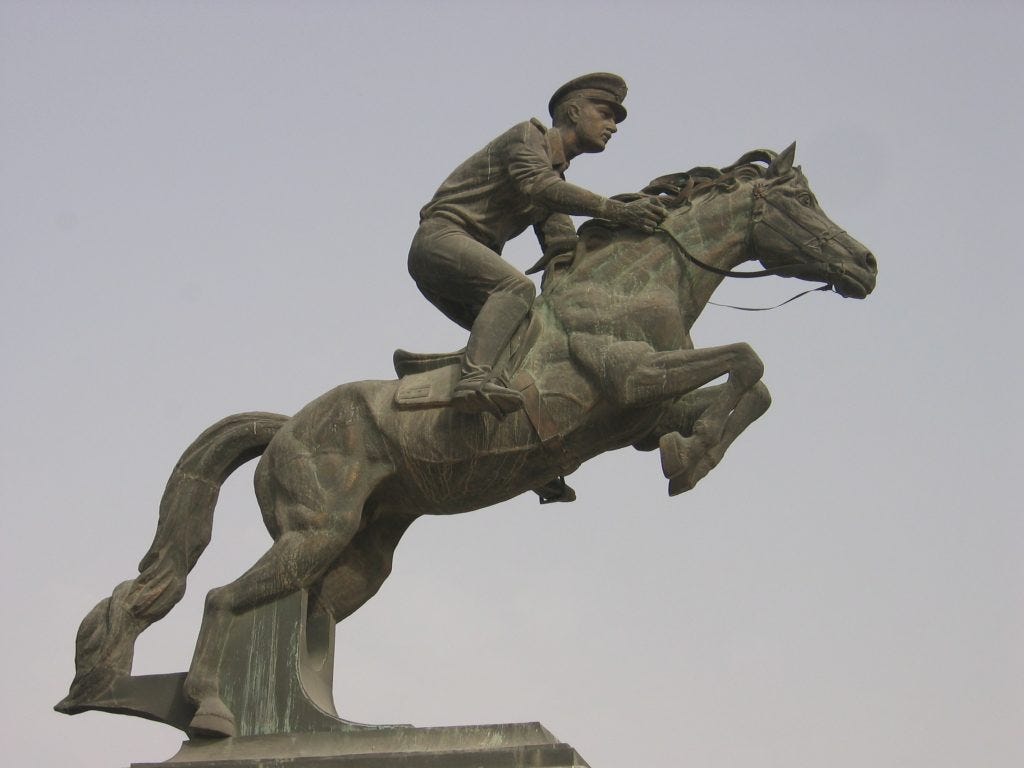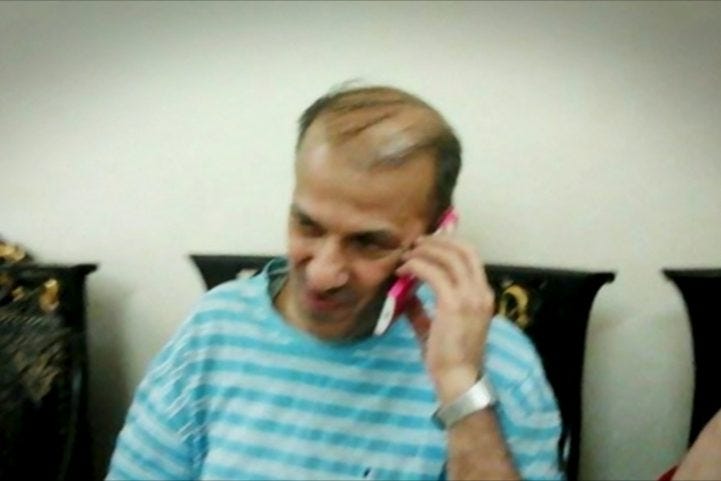The Fall of the Golden Knight
When a renowned horserider bested Bashar al-Assad’s brother in an equestrian competition, he couldn’t have imagined it would cost him 21 years in one of Syria’s infamous military prisons.

Welcome to Sports Politika, a media venture founded by investigative journalist and researcher Karim Zidan that strives to help you understand how sports and politics shape the world around us. Our mission is to offer an independent platform for accessible journalism that raises awareness and empowers understanding.
If you share this vision, please consider supporting us by joining our community and becoming a paid subscriber.
For a brief second—just as rebels tugged the rope tied to a statue of Bashar al-Assad’s brother on horseback—the bronze rider appeared suspended in mid-air, as though defying gravity’s pull. Then, thrown from his perch, the rider tumbled through the air and crashed headfirst to the ground. The crowd burst into celebration, punctured by the roar of gunfire.
Situated in the heart of Aleppo, Syria’s second largest city and one of the oldest consistently inhabited places in the world, the statue once depicted Bassel al-Assad, the eldest son of former Syrian dictator Hafez al-Assad. A lover of fast cars, horses and women, Bassel was the heir apparent to his father’s dynasty, which began in 1971 following a coup the previous year. He was also symbol of the regime’s nepotism, corruption, and ruthlessness.
In 1994, Bassel died in a car crash, reportedly colliding with a barrier at top speed while not wearing a seatbelt. His death led to his lesser-known brother, Bashar, assuming the role of Syria’s president-in-waiting, while Bassel was elevated to the status of a martyr and a government-imposed symbol of pride for Syrian youth. Statues were erected across the country, including one in Aleppo of Bassel on his favourite steed — the very same statue that would later be torn down by Syrian rebels during their swift advance through the city in November 2024. Within a matter of days, the rebels would capture more cities, including Damascus, bringing an end to the Assad family’s five decade hold on Syria.
Much like Bassel, the equestrian statue was a symbol of Syrian oppression. Though he died at just 31 years of age, many Syrians reportedly suffered his wrath during his brief yet destructive time as Syria’s golden boy. Among those who bore the brunt of Bassel’s rage was Adnan Qassar, the former captain of Syria’s equestrian team, who spent 21 years in prison for the crime of outperforming the heir apparent during a tournament.
Bassel had once trained at the equestrian club founded by Qassar’s family. However, he reportedly had little experience with horses and lacked the talent that Qassar possessed in the sport. While Qassar was a renowned champion, Bassel was accustomed to accolades he hadn't truly earned. His sycophantic loyalists even referred to him as the “Golden Knight.”
In June 1993—just six months before Bassel’s death—the Syrian equestrian team took part in that year’s Mediterranean Games, held in Languedoc-Roussillon, France. During their performance, Bassel performed poorly and almost cost Syria an opportunity to medal at the event. Qassar, however, managed to salvage the situation with a near-perfect performance that helped secure Syria one of its four gold medals at the Games.
Several months later, Qassar was arrested at his equestrian club on fabricated charges of attempting to assassinate the president’s son. Without being granted trial, he was handed an indefinite sentence at the notorious Tadmur Military Prison.
According to reports, upon his arrival at Tadmur, Qassar was thrown into solitary confinement, where he received a message from Bassel Assad that read: “If we had not shared bread and salt, I would have ordered your execution in Al-Abbasiyyin Square. But instead, I will ‘pardon’ your execution and settle for imprisoning you.”
By January 1994, Bassel was dead. Yet Qassar’s fate remained unchanged. He was subjected to regular torture and humiliation. Some of the torture specifically coincided with the anniversary of Bassel’s death.
When Bashar assumed the presidential mantle in 2000, Qassar’s family, along with several human rights organizations, attempted to raise his case to the newly coronated Syrian leader. Assad response was cruel and simple: “I never entered Adnan’s prison, Bassel did. If you want Adnan out, go and resurrect Bassel to do it.”
Qassar’s torment continued until June 15, 2014, when he was finally released following a presidential pardon. By then, Qassar had served 21 years in prison for the simple crime of besting a member of Assad’s family.
In a tribute piece published the day after Qassar’s release, one of his former cellmates, Omar al-Abdullah, wrote affectionately about how the horse racing champion “extended his deep true empathy and love to everyone” he shared his prison cell with. He taught his cellmates basic English and was known for his drawings of horses, which he would sketch in charcoal or carve on a bar of soap. No matter how much the regime tried to break him, Al-Abdullah added, Qassar’s “spirit only grew stronger and more resilient.”
“Adnan, they may have succeeded in taking away your physical freedom, but they could never extinguish the noble spirit of the knight that resides within you,” he concluded. May your freedom be blessed, dear knight.”
It has been 10 years since Qassar emerged from the dark depths of Syria’s prisons. Little has been seen or heard of him. Yet, as footage spread of the rebels tearing down Bassel’s statue in Aleppo—dethroning the so-called Golden Knight from his cherished steed—it is easy to imagine the faint smile crossing his weathered face. The knight had, at last, bested the regime.
Related Reading:
Sports Politika is a media platform dedicated to the intersection of sports, power and politics. If you like what you see, upgrade to a paid subscription ( or gift a subscription if you already have your own). We would appreciate if you could also like the post and let us know what you think in the comment section below.







21 years for winning a gold medal...what a story